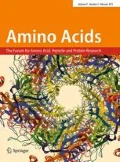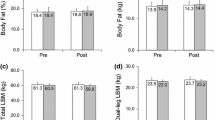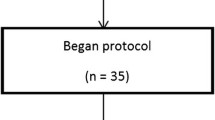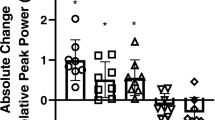Abstract
Within the aging population, there exists a subset of individuals termed masters athletes (MA). As masters-level competition increases in popularity, MA must find methods to enhance individual athletic performance. Longitudinal beta-alanine (BA) supplementation is suggested to enhance physical capability during exercise; however, these effects have not been evaluated in MA. To examine the longitudinal effects of BA on time to exhaustion (TTE), total work completed (TWC), and lactate clearance in female MA cyclists. Twenty-two female MA (age = 53.3 ± 1.0) participated in this double-blind design. Subjects were randomly assigned to BA (n = 11; 800 mg BA + 8 g dextrose) or placebo (PLA; n = 11; 8 g dextrose) groups and supplemented 4 doses/day over 28 days. Every 7 days, subjects completed a cycling TTE at 120 % VO2max, and TWC was calculated. Blood lactate was measured at baseline, immediate post, and 20-min post each TTE. No significant differences existed between groups for any variable at baseline (p > 0.05). After 28 days supplementation, BA had greater TTE (23 vs 1 % change) and TWC (21 vs 2 % change) than PLA (p < 0.05). Following the 20-min TTE recovery, lactate was 24 % lower in BA compared to PLA (4.35 vs. 5.76 mmol/L, respectively). No differences existed for variables during intermittent weeks. 28 days of BA supplementation increased cycling performance via an enhanced time to exhaustion and total work completed with associated lactate clearance during passive rest in female MA.


Similar content being viewed by others
References
Andez-Garcia BF, Perez-Landaluce J, Rodriguez-Alonso M, Terrados N (2000) Intensity of exercise during road race pro-cycling competition. Med Sci Sports Exerc 32(5):1002–1006
Astorino TA, Robergs RA, Ghiasvand F, Marks D, Burns S (2000) Incidence of the oxygen plateau at VO2max during exercise testing to volitional fatigue. J Exerc Physiol Online 3(4):1–12
Baguet A, Koppo K, Pottier A, Derave W (2010) β-Alanine supplementation reduces acidosis but not oxygen uptake response during high-intensity cycling exercise. Eur J Appl Physiol 108(3):495–503
Bex T, Chung W, Baguet A, Stegen S, Stautemas J, Achten E, Derave W (2014) Muscle carnosine loading by beta-alanine supplementation is more pronounced in trained vs untrained muscles. J Appl Physiol 116(2):204–209
Culbertson JY, Kreider RB, Greenwood M, Cooke M (2010) Effects of beta-alanine on muscle carnosine and exercise performance: a review of the current literature. Nutrients 2(1):75–98
del Favero S, Roschel H, Solis MY, Hayashi AP, Artioli GG, Otaduy MC, Leite CC (2012) Beta-alanine (carnosyn™) supplementation in elderly subjects (60–80 years): effects on muscle carnosine content and physical capacity. Amino Acids 43(1):49–56
Derave W, Özdemir MS, Harris RC, Pottier A, Reyngoudt H, Koppo K, Achten E (2007) β-Alanine supplementation augments muscle carnosine content and attenuates fatigue during repeated isokinetic contraction bouts in trained sprinters. J Appl Physiol 103(5):1736–1743
Derave W, Everaert I, Beeckman S, Baguet A (2010) Muscle carnosine metabolism and β-alanine supplementation in relation to exercise and training. Sports Med 40(3):247–263
Eudy AE, Gordon LL, Hockaday BC, Lee DA, Lee V, Luu D, Ambrose PJ (2013) Efficacy and safety of ingredients found in preworkout supplements. Am J Health Syst Pharm 70(7):577–588
Everaert I, Mooyaart A, Baguet A, Zutinic A, Baelde H, Achten E, Derave W (2011) Vegetarianism, female gender and increasing age, but not CNDP1 genotype, are associated with reduced muscle carnosine levels in humans. Amino Acids 40(4):1221–1229
Ghiasvand R, Askari G, Malekzadeh J, Hajishafiee M, Daneshvar P, Akbari F, Bahreynian M (2012) Effects of six weeks of β-alanine administration on VO2max, time to exhaustion and lactate concentrations in physical education students. Int J Prev Med 3(8):559–563
Gladden LB (2004) Lactate metabolism: a new paradigm for the third millennium. J Physiol 558(1):5–30
Halson SL, Bridge MW, Meeusen R, Busschaert B, Gleeson M, Jones DA, Jeukendrup AE (2002) Time course of performance changes and fatigue markers during intensified training in trained cyclists. J Appl Physiol 93(3):947–956
Hill C, Harris R, Kim H, Harris B, Sale C, Boobis L, Wise JA (2007) Influence of β-alanine supplementation on skeletal muscle carnosine concentrations and high intensity cycling capacity. Amino Acids 32(2):225–233
Hobson R, Saunders B, Ball G, Harris R, Sale C (2012) Effects of β-alanine supplementation on exercise performance: a meta-analysis. Amino Acids 43(1):25–37
Hodge K, Allen JB, Smellie L (2008) Motivation in masters sport: achievement and social goals. Psychol Sport Exerc 9(2):157–176
Hoffman J, Ratamess NA, Faigenbaum AD, Ross R, Kang J, Stout J, Wise JA (2008) Short-duration β-alanine supplementation increases training volume and reduces subjective feelings of fatigue in college football players. Nutr Res 28(1):31–35
Karlsson J (1971) Lactate in working muscles after prolonged exercice. Acta Physiol Scand 82(1):123–130
Kavanagh T, Shephard RJ (1977) The effects of continued training on the aging process. Ann NY Acad Sci 301(1):656–670
Kendrick IP, Harris RC, Kim HJ, Kim CK, Dang VH, Lam TQ, Wise JA (2008) The effects of 10 weeks of resistance training combined with β-alanine supplementation on whole body strength, force production, muscular endurance and body composition. Amino Acids 34(4):547–554
Kendrick IP, Kim HJ, Harris RC, Kim CK, Dang VH, Lam TQ, Wise JA (2009) The effect of 4 weeks β-alanine supplementation and isokinetic training on carnosine concentrations in type I and II human skeletal muscle fibres. Eur J Appl Physiol 106(1):131–138
Kern BD, Robinson TL (2011) Effects of β-alanine supplementation on performance and body composition in collegiate wrestlers and football players. J Strength Cond Res 25(7):1804–1815
McCormack WP, Stout J, Emerson NS, Scanlon TC, Warren AM, Wells AJ, Fragala MS (2013) Oral nutritional supplement fortified with beta-alanine improves physical working capacity in older adults: a randomized, placebo-controlled study. Exp Gerontol 48(9):933–939
National Senior Games Association (2013) History of the NSGA. http://www.nsga.com/history.aspx. Accessed 15 Dec 2014
Rodriguez-Marroyo JA, Garcia-Lopez J, Juneau CE, Villa JG (2009) Workload demands in professional multi-stage cycling races of varying duration. Br J Sports Med 43(3):180–185
Rosenbloom C, Bahns M (2006) What can we learn about diet and physical activity from master athletes? Holist Nurs Pract 32(3):1–6
Sale C, Saunders B, Harris RC (2010) Effect of beta-alanine supplementation on muscle carnosine concentrations and exercise performance. Amino Acids 39(2):321–333
Sale C, Saunders B, Hudson S, Wise JA, Harris RC, Sunderland CD (2011) Effect of beta-alanine plus sodium bicarbonate on high-intensity cycling capacity. Med Sci Sports Exerc 43(10):1972–1978
Simmonds MJ, Minahan CL, Sabapathy S (2010) Caffeine improves supramaximal cycling but not the rate of anaerobic energy release. Eur J Appl Physiol 109(2):287–295
Smith A, Walter AA, Graef JL, Kendall KL, Moon JR, Lockwood CM, Stout J (2009) Effects of β-alanine supplementation and high-intensity interval training on endurance performance and body composition in men; a double-blind trial. J Int Soc Sports Nutr 6(1):1–9
Smith A, Stout J, Kendall K, Fukuda D, Cramer J (2012) Exercise-induced oxidative stress: the effects of β-alanine supplementation in women. Amino Acids 43(1):77–90
Stegen S, Bex T, Vervaet C, Vanhee L, Achten E, Derave W (2014) Beta-alanine dose for maintaining moderately elevated muscle carnosine levels. Med Sci Sports Exerc 46(7):1426–1432
Stout J, Cramer JT, Mielke M, O’kroy J, Torok DJ, Zoeller RF (2006a) Effects of twenty-eight days of beta-alanine and creatine monohydrate supplementation on the physical working capacity at neuromuscular fatigue threshold. J Strength Cond Res 20(4):928–931
Stout J, Cramer J, Zoeller R, Torok D, Costa P, Hoffman J, Okroy J (2006b) Effects of β-alanine supplementation on the onset of neuromuscular fatigue and ventilatory threshold in women. Amino Acids 32(3):381–386
Stout J, Graves BS, Smith AE, Hartman MJ, Cramer JT, Beck TW, Harris RC (2008) The effect of beta-alanine supplementation on neuromuscular fatigue in elderly (55–92 years): a double-blind randomized study. J Int Soc Sports Nutr 5(1):1–6
Striegel H, Simon P, Wurster C, Niess A, Ulrich R (2005) The use of nutritional supplements among master athletes. Int J Sports Med 27(3):236–241
Tanaka H, Seals DR (2008) Endurance exercise performance in masters athletes: age-associated changes and underlying physiological mechanisms. J Physiol 586(1):55–63
Tobias G, Benatti FB, de Salles PV, Roschel H, Gualano B, Sale C, Artioli GG (2013) Additive effects of beta-alanine and sodium bicarbonate on upper-body intermittent performance. Amino Acids 45(2):1–9
Van Thienen R, Van Proeyen K, Vanden EB, Puype J, Lefere T, Hespel P (2009) Beta-alanine improves sprint performance in endurance cycling. Med Sci Sports Exerc 41(4):898–903
Vivodtzev I, Gagnon P, Pepin V, Saey D, Laviolette L, Brouillard C, Maltais F (2011) Physiological correlates of endurance time variability during constant-workrate cycling exercise in patients with COPD. PLoS One 6(2):1–8
Wasserman K, Beaver WL, Whipp BJ (1986) Mechanisms and patterns of blood lactate increase during exercise in man. Med Sci Sports Exerc 18(3):344–352
Weber CL, Schneider DA (2001) Reliability of MAOD measured at 110 % and 120 % of peak oxygen uptake for cycling. Med Sci Sports Exerc 33(6):1056–1059
Acknowledgments
The authors would like to thank Powder City™ for donating the beta-alanine used for this investigation. We would also like to thank Carly Arnold, Landon Lavene, Mikaila Davis, Aaron Martinez, and Lauren Wethington for their help during the preparatory requirements and data collection processes.
Author information
Authors and Affiliations
Corresponding author
Ethics declarations
Conflict of interest
The authors declare they have no conflicts of interest associated with this study.
Rights and permissions
About this article
Cite this article
Glenn, J.M., Gray, M., Stewart, R. et al. Incremental effects of 28 days of beta-alanine supplementation on high-intensity cycling performance and blood lactate in masters female cyclists. Amino Acids 47, 2593–2600 (2015). https://doi.org/10.1007/s00726-015-2050-x
Received:
Accepted:
Published:
Issue Date:
DOI: https://doi.org/10.1007/s00726-015-2050-x




